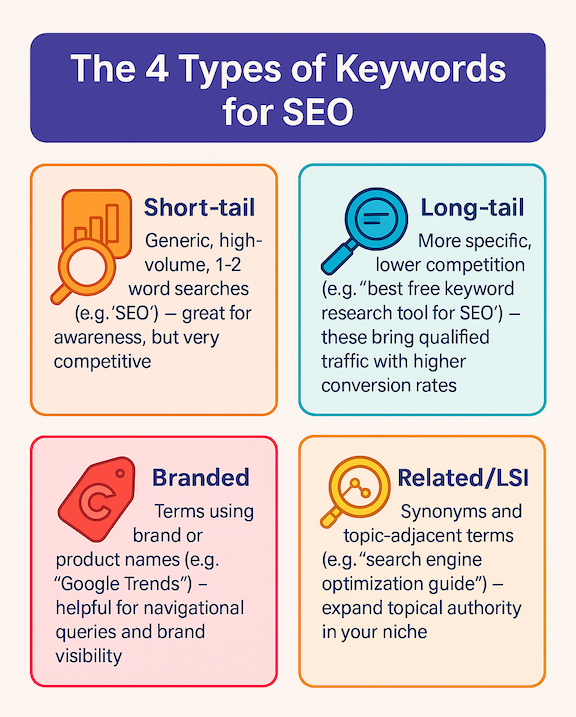Did you know that 75% of users never scroll past the first page of search results ? If your site isn’t ranking, you’re practically invisible. That means your keyword research for SEO is the linchpin between being discovered by thousands or languishing in digital obscurity. In this comprehensive guide, you'll uncover industry secrets, unique strategies, and practical steps to ensure every piece of content you publish unlocks traffic goldmines and drives tangible growth.
Unlocking the Power of Keyword Research for SEO: Unconventional Facts That Drive Rankings
"75% of users never scroll past the first page of search results—your keyword research for SEO determines if you’ll ever be seen."
Did you know most websites miss their biggest traffic spikes due to poor keyword research for SEO? Discover why in this guide and learn how to tap into golden keyword opportunities.

Why Keyword Research for SEO is Essential for Sustainable Growth
Role of keyword research in organic traffic growth: Effective keyword research for SEO is the foundation of any high-performing SEO campaign. By identifying the phrases your target audience is searching for, you ensure your content appears for the right users at the right time. This increases organic traffic, as each optimized page is tailored to meet specific user queries.
Impact on conversion rates and business visibility: Keyword research shapes how visible your business is in search results and directly impacts conversion rates. When your content is aligned with purchase or solution-seeking queries, users are more likely to engage, sign up, or buy—fueling real, measurable business growth.
Evolution of keyword research tools and techniques: The evolution from basic seo tool s to sophisticated research tools like Google Trends and advanced keyword research tool platforms has transformed how marketers discover keyword goldmines. Today, using a mix of free keyword research tool options and premium platforms is vital for comprehensive strategy.
"The right keyword research tool is the compass guiding your content to search engine success."
Demystifying Search Intent: The Backbone of Effective Keyword Research for SEO
Types of search intent: informational, navigational, commercial, transactional Understanding user intent is the key to keyword research for SEO. Some users are looking for information, while others are ready to buy (transactional), want to locate a specific brand (navigational), or compare options (commercial).
Aligning content strategy with search intent: Aligning your content to match each intent means better user experiences and higher rankings. For example, a well-targeted blog post addresses an informational search, while a landing page serves transactional intent.
How search intent influences keyword list choices: Choosing keywords based on intent shifts your focus from sheer search volume to strategic targeting. This alignment ensures each keyword list supports your site’s goals and delivers users that matter most.

Quick Table: Four Types of Keyword Research for SEO
Type |
Description |
Search Intent |
Example |
|---|---|---|---|
Short-tail |
1-2 words, high volume, broad |
Informational/Navigational |
SEO |
Long-tail |
3+ words, specific, targeted |
Commercial/Transactional |
best free keyword research tool for ecommerce |
Branded |
Brand or product names |
Navigational |
Google Trends |
LSI/Related |
Synonyms & topic-related |
Informational/Commercial |
search engine optimization guide |
Step-by-Step Guide: How to Do Keyword Research for SEO
Building Your Keyword List: Where to Start
Identify seed and related keywords: Begin your keyword research for SEO by brainstorming a list of keywords relevant to your business. Start with basic seed keywords directly related to your products or services, and expand by considering synonyms, topic-related keywords, and questions your audience asks.
Brainstorm keyword ideas and keyword idea expansion: Use a variety of sources, like Google search suggestions, forums, and keyword idea generator tools, to develop keyword ideas. Expand your list by thinking about all the variations and long-tail keywords that relate to each core term.
Analyze current keyword list with Google Search Console and other research tools: Plug your initial keyword list into Google Search Console, your favorite research tool, or a free keyword research tool to uncover new opportunities, spot gaps, and monitor which keywords already drive traffic to your site.

Analyzing Keyword Difficulty and Search Volume
Choose keywords with optimal search volume: Don’t target only the most popular keywords. Instead, balance search volume with competition, aiming for terms that get decent traffic but aren’t impossible to rank for.
Assess keyword difficulty with research tools: Use tools like SEMrush, Ahrefs, or Moz to evaluate keyword difficulty . These tools rate competitiveness on a scale, so focus on the “sweet spot”—keywords your site has a realistic chance of ranking for.
Prioritize achievable keywords for your niche: A smart keyword plan includes quick wins (low competition, moderate volume) and a few aspirational keywords you hope to rank for as your site builds authority. This balanced approach ensures ongoing momentum in your SEO campaign.
Evaluating Competition: Find Goldmine Keywords Your Competitors Miss
Use research tools to study competitor keyword lists: Identify what’s already working in your niche by analyzing competitors' websites using a research tool. Export their list of keywords and look for patterns in what they target—then find ways to do it better.
Uncover keyword gaps and untapped search volume: By spotting which keywords they rank for—and, importantly, those they miss—you can discover “goldmine” opportunities. Free keyword research tools and Google Ads can give you a clear view of overlooked terms.
How to spy on competitor Google Ads and Google keyword planner campaigns: Use the Google Keyword Planner and Google Ads competitive analysis features to peek at your rivals’ paid campaigns. Their spending highlights high-value keywords (with strong intent and search volume) you might want to pursue organically.

Creating a Keyword Plan and Mapping to Content
Match keyword list to site architecture: Organize your keyword list so each core group targets a specific URL or page. Structure your site so every main landing page, blog post, and category is mapped to the most relevant keywords.
Build a keyword planner spreadsheet: Track keyword ideas, search volumes, intent, competition level, and mapped URLs in a spreadsheet or keyword planner tool. This organization allows you to quickly spot coverage gaps and adjust your keyword plan as new trends emerge.
Develop a keyword plan for blog posts, landing pages, and category targeting: Assign high-intent, transactional keywords to landing pages, informational terms to blog posts, and broader phrases to main category pages. This strategic mapping ensures every part of your website is discoverable in search engines.

Top Keyword Research Tools for SEO: Paid and Free Options Reviewed
Overview of best keyword research tools: When it comes to uncovering high-converting keywords, you’ll want to harness a variety of research tools . Top picks include Google Keyword Planner, Ahrefs, SEMrush, Moz Keyword Explorer—a blend of free keyword research tool options and paid powerhouses.
Pros/cons of each: Paid tools offer advanced insights, competitive analysis, and robust keyword difficulty metrics. Free keyword research tools like Ubersuggest and Google Trends provide solid basics, letting you build a strong foundation without upfront investment.
Tips to combine multiple free keyword research tools for superior insights: Because no single research tool gives the full picture, merge data from Google Keyword Planner, Google Trends, and other search tool platforms to ensure you never miss an opportunity. Triangulating data helps you spot trends not visible with a single tool.
"A single research tool won’t give you the full picture—combine several for truly goldmine results."

How to Use Free Keyword Research Tools for Powerful Results
Tutorial: Using Google Keyword Planner and Google Trends: Sign in to Google Keyword Planner to get trend data and search volume for each keyword idea. Pair with Google Trends to spot seasonality or rising keyword topics. Both are invaluable for free keyword research.
How to extract keyword ideas from Google Search Console and search engines: Google Search Console reveals exact search queries bringing users to your site. Dive into this data, then use Google’s “autocomplete” and “people also ask” features to brainstorm even more keyword ideas.
Free browser plugin keyword research tools to try now: Download tools like Keyword Surfer or MozBar to overlay keyword metrics right in search engine results while you browse. This efficient workflow helps you build a powerful keyword list, even on a tight budget.
Generating Keyword Ideas and Building a Winning Keyword List
Brainstorming related keywords and topics using keyword idea generators: Don’t limit your keyword research for SEO to core phrases—let keyword idea generators expand your universe. Tools like Answer the Public, AlsoAsked, or any advanced search tool can suggest questions, synonyms, and long-tails you might not have considered.
Harnessing social listening and Google search suggestions: Use social media monitoring tools to track evolving conversations and trends. Combine these insights with Google’s predictive search and “related searches” at the bottom of the page for an endless well of keyword ideas.
Using keyword lists to target search engine rankings effectively: Once your list is robust, segment keywords by search intent and funnel stage, then map them back into your SEO strategy. This ensures your content effectively targets both user needs and search engine algorithms.

Bonus: Advanced Keyword Research Strategies for SEO Specialists
Leveraging Google Trends for seasonality and market shifts: Use Google Trends to monitor keyword seasonality and adjust content to surging topics before competitors. This approach can help you capture search volume spikes and ride waves before they crest.
Stealing competitors’ rank with smart keyword selection: Analyze competitors’ top-performing content and find low-hanging fruit keywords they rank for. Create deeper, more valuable versions of their content to edge past them in the search results.
Discovering LSI and low-competition keyword ideas: Leverage LSI (Latent Semantic Indexing) keyword tools and Google’s “related searches” to find synonyms and contextually related keywords, then combine these with search volume and competition data for a winning edge.
For a practical demonstration of the entire keyword research for SEO process, watch our step-by-step video tutorial. You’ll see live examples of keyword research tools, magic with Google Keyword Planner, and how to build a winning keyword plan in real time.
People Also Ask: How Do You Research Keywords for SEO?
Comprehensive process for keyword research for SEO
Identify main topics: Start by pinpointing your core subjects and business goals—these form the basis of your keyword ideas.
Generate keyword ideas: Use Google search, keyword tools, and brainstorming sessions to rapidly build a comprehensive keyword list.
Analyze keyword difficulty and search volume: Leverage research tools to assess which terms are both attainable and worth pursuing based on competition and search volume.
Assess competition: Investigate what your top competitors are targeting and locate untapped opportunities in their keyword lists.
Build a keyword plan using top research tools: Organize, document, and prioritize your targets. Top tools include Google Keyword Planner, SEMrush, and Google Trends.

People Also Ask: What is the Best Keyword Research Tool for SEO?
Top recommended paid and free keyword research tools
Industry favorites: For deep research and analysis, Ahrefs, SEMrush, and Moz Keyword Explorer excel, offering in-depth competitor insights, keyword difficulty metrics, and historical search volume data.
Free options: Ubersuggest, Google Trends, Keyword Surfer, and Google Keyword Planner. These tools enable you to build a solid list of key targets without subscription fees.
Combine tools for a comprehensive keyword list: Mix data from both free and paid research tools to catch trends, seasonal shifts, and keyword overlaps for a truly holistic SEO strategy.
People Also Ask: What Keywords are Best for SEO?
Qualities of high-performing SEO keywords
High search intent: The best keywords are directly aligned with what users want right now, leading to stronger engagement and better conversion rates.
Moderate competition and solid search volume: Focus on terms that are achievable yet impactful—aspiring for highly competitive terms is tempting, but winning with realistic targets generates traffic and authority over time.
Relevance to target audience: Each keyword should fit naturally with your audience’s needs, ensuring users who find your pages are more likely to linger and convert.
Mix of short-tail and long-tail keywords: Include both broad and specific keywords in your planner to capture intent at every stage of the user journey.
People Also Ask: What are the 4 Types of Keywords for SEO?

Overview of keyword types in SEO
Short-tail: Generic, high-volume, 1-2 word searches (e.g., “SEO”)—great for awareness, but very competitive.
Long-tail: More specific, lower competition (e.g., “best free keyword research tool for SEO”)—these bring qualified traffic with higher conversion rates.
Branded: Terms using brand or product names (e.g., “Google Trends”)—helpful for navigational queries and brand visibili
Related/LSI: Synonyms and topic-adjacent tes (e.g., “search engine optimization guide”)—expand topical authority in your niche.
Watch our dedicated guide to Google Trends and learn live how to time your content and capture seasonal keyword trends for your SEO campaigns.
Expert Tips: Common Mistakes to Avoid in Keyword Research for SEO
Ignoring search intent when building keyword lists: Always align your target keywords with the real reasons users search, not just search volume.
Focusing only on high-volume keywords: High search volume keywords are the most competitive. Balance your targeting to include achievable, intent-driven terms too.
Neglecting related keywords and keyword difficulty: Broaden your keyword list by incorporating related keywords and always check the real competition to ensure your plan is realistic.
Underutilizing free keyword research tools like Google Trends and Google Keyword Planner: These tools can provide valuable, actionable insights—don’t overlook them in your research process.

Level up your strategy with actionable video advice on competitor research, long-tail keyword tactics, and advanced mapping for higher rankings.
Frequently Asked Questions on Keyword Research for SEO
How often should I review my keyword list and keyword plan? Review your keyword list and plan at least quarterly. This lets you spot new opportunities, adjust for algorithm updates, and stay ahead of trends.
Can I rely solely on free keyword research tools for SEO? While free keyword research tools like Google Keyword Planner and Google Trends provide a solid foundation, consider combining them with paid research tools for deeper insights and competitive analysis.
What’s the best way to analyze keyword difficulty? Use research tools with robust keyword difficulty metrics—such as Ahrefs, SEMrush, or Moz. They assess competition, backlink strength, and SERP analysis to guide your targeting.
Key Considerations for Effective Keyword Research for SEO Success
Update your keyword plan with new keyword ideas regularly.
Align all content with search intent and business goals.
Monitor competitors’ rank and adapt your keyword list accordingly.
Leverage multiple research tools for the most comprehensive insights.

Ready to Grow? Book Your Free SEO Strategy Session Today
Unlock your full ranking potential. Ready to grow your business? Book your free strategy session with a Reach Strategic Content Strategist today.

Conclusion
Begin refining your keyword research for SEO today: update your keyword plan often, use multiple research tools, and always align your keywords with search intent for rapid, sustainable ranking growth.
Sources
https://www.searchenginejournal.com/keyword-research-guide/ – Search Engine Journal
https://support.google.com/google-ads/answer/6325025?hl=en – Google Ads Help
To enhance your understanding of keyword research for SEO, consider exploring the following authoritative resources:
Keyword Research: The Beginner’s Guide by Ahrefs
This comprehensive guide delves into the fundamentals of keyword research, offering step-by-step instructions and practical tips to identify valuable search queries that can drive targeted traffic to your website.
Keyword Research: An In-Depth Beginner’s Guide by Search Engine Journal
This resource provides an extensive overview of keyword research, covering essential concepts, tools, and strategies to help you effectively target the right keywords and improve your site’s search engine rankings.
By consulting these guides, you’ll gain valuable insights and practical techniques to refine your keyword research strategy and enhance your SEO efforts.
 Add Row
Add Row  Add
Add 




Write A Comment